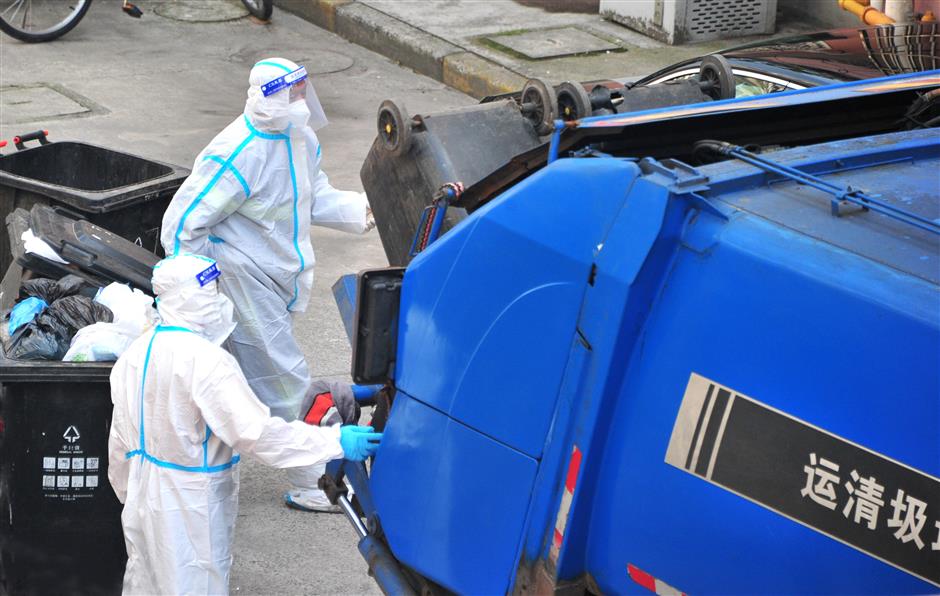Shanghai initiates environmental disinfection campaign to curb COVID-19

A volunteer delivers online orders to residents in a local community under lockdown.
Shanghai will launch an environmental disinfection campaign in key areas across the city to curb the ongoing COVID-19 resurgence, according to the Shanghai Health Commission.
The monthlong "preventative disinfection" work will be conducted at 10 kinds of key local sites, including office buildings, construction sites, public areas, transports, wet markets, shopping malls, communities, campuses and nursing homes.
"Environmental sanitation and disinfection is one of the most effective measures to curb the spread of COVID-19," said Wu Huanyu, deputy director of the Shanghai Center for Disease Control and Prevention, at the city's daily COVID-19 press briefing. "A scientific, accurate and effective sterilization campaign can kill the viruses that have already or might exist in the environment."
The quarantine wards and accommodations for COVID-19 patients, for instance, will receive continuous disinfection, while hospitals, airports and bus stations will have more frequent disinfection on the surface of items.
Wu noted that doorknobs and elevator buttons must be cleaned and disinfected more strictly because they are touched by people frequently.
No massive outdoor or air disinfection will be carried out, and sanitizer won't be sprayed directly on people or in ponds, reservoirs and lakes. No chemical disinfectants can be used in indoor areas when people are inside, Wu said.

Residents in the city's phased lockdown areas receive the second round of PCR tests.
Jin Chen, deputy director of the Shanghai Housing and Urban-Rural Development Commission, said the 10 key sites getting "systematic and general" disinfection are the most frequently visited areas.
They are:
- Office buildings (including commercial facilities, offices and parks)
- Construction sites (including workers' dormitories, canteens and toilets)
- Public areas (including parks, greenbelts, public toilets and "urban furniture" like benches, guard bars, pavilions and boxes)
- Transport tools (including transport hubs, stations, subways, buses, taxis, trains and aircraft)
- Wet markets
- Large shopping malls
- Communities (including neighborhoods and rental houses)
- Schools (including kindergartens, primary, secondary and high schools as well as universities and training institutes)
- Nursing homes
- Families

Volunteers arrange online orders for residents under lockdown.
Jin said detailed stipulation and disinfection standards have been issued by the center, and an online training will be publicized to both disinfection workers and citizens.
Stair handrails, doorknobs and access intercoms at local residential communities, for instance, will be cleaned with disinfectant wipes or mist spray three times a day. Garbage bins will be cleaned and disinfected once a day.
The principle of the disinfection campaign is to avoid influencing people's daily lives, especially at the public transports, shopping complexes and office buildings, he said.
Citizens should avoid over disinfecting their homes but should ventilate at least twice a day for 30 minutes each time, Jin said.

Piles of vegetable packs for residents under quarantine in Fengxian District
The city reported 326 locally transmitted COVID-19 cases and 5,656 local asymptomatic infections on Tuesday, said Wu Qianyu, an official with the health commission.
Of all the local infections, 18 confirmed patients had previously asymptomatic infections. Seventeen confirmed patients and 5,131 asymptomatic cases were detected during central quarantine, while the rest were found in screenings of high-risk people.
Two additional areas in Shanghai, 920 Tingyue Road in Huinan Town, the Pudong New Area, and the dormitory of a construction site at Jianchuan Road Comprehensive Service Center in Minhang District, have been downgraded to low risk, reducing the number of medium-risk areas in the city to 13.
A total of 9.1 million citizens in Pudong, Punan and adjacent areas in the eastern and southern bank of the Huangpu River, which are under the city's staggered lockdown, have received the first round of nucleic acid testing.
The second round of polymerase chain reaction (PCR) testing will be conducted on Wednesday for citizens living in the region under lockdown, which will be lifted on Friday morning.
In Puxi, some 10.87 million citizens have received the antigen self-testing, ahead of a lockdown on this region from Friday.

Garbage treatment staff handles household waste for communities under quarantine.
A certain number of abnormal results have been detected during the massive screening process, which is key to curb the spread of the pandemic as quickly possible, Wu said.
Citizens have been asked to take PCR tests in batches, maintain distance from others, wear masks and avoid gatherings.
She said additional large stadiums and venues are being renovated to become central quarantine sites for the surging number of positive cases reported in Shanghai every day.
These sites have been under strict evaluation, such as their distance to communities, medical waste and sewage treatment as well as disinfection, to avoid impacting the nearby environment, she added.
Shanghai has built three garbage treatment facilities for the disposal of medical waste. They can treat 392 tons of medical waste every day, according to the city's bureau of ecology and environment.
The Shanghai Public Health Clinical Center, the main designated hospital for COVID-19 patients, has its own garbage treatment facility.
On Tuesday, the city handled 544 tons of medical waste, including 10 percent from local designated hospitals, fever clinics and central quarantine sites, and 48 percent of household waste from quarantine sites.
Garbage from the central quarantine site must be double wrapped and sealed before being dumped in designated bins. They will be transported by specialized personnel, vehicles and routes and incinerated every day, said Ren Juping, an official with the ecology and environment bureau.

















